What does Pentecost mean?
For Christians, Pentecost commonly represents the outpouring of Holy Spirit; the gifts of Holy Spirit made available for everyone.

For Jews, Shavuot "Weeks," Hellenized Pentecost is the culmination of the Passover, redemption of Israel, Atzeret Pesach "the Gathering of Passover."
While the Exodus from Egypt lead
to the revelation of Sinai, Passover
marked the giving of the Torah to
the Jewish people.
God delivered the Jews out of Egypt to be His own treasured people, holy & separated from the pagans around them.
What is Shavuot?
Hebrew meaning of Shavuot: “Weeks”
Transliteration: Shavuos
English Name: Pentecost
aka Feast of Weeks, Feast of Harvest,
Feast of Firstfruits
Western Calendar: May/June
Jewish Calendar Date: Sivan 6–7
Duration: One day in Israel;
traditionally two days in the
Diaspora. Some Diaspora
communities celebrate only
one day.
Established: In biblical times.
See Exodus 23, 34; Leviticus 23;
Deuteronomy 26
Yom Ha-Bikkurim
Shavuot was a way for the children of Israel to offer their best to the Lord.
The first of the firstfruits of your land you shall bring into the house of the Lord your God
Exodus 23:19a; 34:26.
And it shall be, when you come into the land which the Lord your God is giving you as an inheritance, and you possess it and dwell in it, that you shall take some of the first of all the produce of the ground, which you shall bring from your land that the Lord your God is giving you, and put it in a basket and go to the place where the Lord your God chooses to make His name abide. And you shall go to the one who is priest in those days, and say to him, ‘I declare today to the Lord your God that I have come to the country which the Lord swore to our fathers to give us.’ Then the priest shall take the basket out of your hand and set it down before the altar of the Lord your God.
Deuteronomy 26
You shall count seven weeks. Begin to count the seven weeks from the time the sickle is first put to the standing grain. Then you shall keep the Feast of Weeks to the LORD your God with the tribute of a freewill offering from your hand, which you shall give as the LORD your God blesses you. And you shall rejoice before the LORD your God.
Deutronomy 16:9-11
In Hebrew sheva is seven, shavu'ah is week, shavu'ot is weeks. Seven weeks after the first harvest of barley is the celebration of Shavuot "weeks", is one of the three pilgrimage holidays where Jews would come to the mishkan, the tabernacle, later the Temple to present the firstfruits of their spring crops to the Lord.
As Shavuot occurs on the 50th day after Passover, the Greek translators of Torah called this day Pentecost.
First fruits of the crops were called bikkurim, especially Shivat Ha'minim the seven species of fruits of the Promised Land: wheat, barley, grapes, figs, pomegranates, olives, and dates (Deuteronomy 8:8).
When a Jewish farmer saw the first sign of ripening fruit in his field or orchard, he would tie a string or ribbon around it to designate it bikkurim.
He then would pick the bikkurim, put it in a woven gold & silver basket (peeled willow branch baskets for the poor) for the mishkan or the Temple in Jerusalem for the festival of Shavuot.
A large procession of Jews would carry their baskets on the road, singing songs of joyful praise, placing their baskets on oxen adorned with garlands of flowers in a grand festival parade to Jerusalem! As the pilgrims passed through various towns along the way, they would be accompanied by others (Deut. 26:1-3) & the procession would grow!
At the mishkan or Temple each family would present their basket of fruits to a kohen priest to be put before the altar while reciting the wandering Aramean passage from the book of Deuteronomy.
10 Tell the Israelites, When you have come into the land I give you and reap its harvest, you shall bring the sheaf of the firstfruits of your harvest to the priest.
11 And he shall wave the sheaf before the Lord, that you may be accepted; on the next day after the Sabbath the priest shall wave it [before the Lord].
Leviticus 23:10-11 AMPC
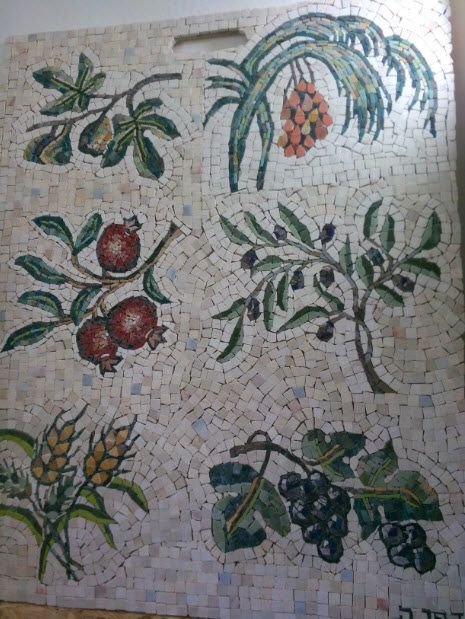
"A good land—a land with brooks, streams, and deep springs gushing out into the valleys and hills; a land with wheat and barley, vines and fig trees, pomegranates, olive oil and honey."
The Seven Species in mosaic by Dafna Birger
At Shavuot, God commands that two loaves of bread are given as a wave offering, which represents His fellowship with both Jew & Gentile.
Giving of Torah is a shadow of God inscribing His law in our hearts!
I will put my law in their inward parts, and write it in their hearts
Jeremiah 31:33b BHS
33 But this is the covenant which I will make with the house of Israel: After those days, says the Lord, I will put My law within them, and on their hearts will I write it; and I will be their God, and they will be My people.
Jeremiah 31:33 AMPC
15 And also the Holy Spirit adds His testimony to us [in confirmation of this]. For having said,
16 This is the agreement (testament, covenant) that I will set up and conclude with them after those days, says the Lord: I will imprint My laws upon their hearts, and I will inscribe them on their minds (on their inmost thoughts and understanding),
Hebrews 10:15-16 AMPC
10 For this is the covenant that I will make with the house of Israel after those days, says the Lord: I will imprint My laws upon their minds, even upon their innermost thoughts and understanding, and engrave them upon their hearts; and I will be their God, and they shall be My people.
Hebrews 8:10 AMPC
The blue sapphire tablets midrashrim
According to Jewish midrash, the tablets of stone of blue sapphire symbolizing the heavens & God's throne, were written by the "finger of God" (Exodus 31:18).
Hebrew letters were bored fully through the stone (Exodus 32:15). The inner fonts of some of the Hebrew letters (like Samekh & the final Mem) floated in place! Even though the letters were bored fully through the stone, the rear of the tablet looked identical to the front!
According to Jewish tradition, the Hebrew script used was the Ketav Ashurit classical Hebrew script used in the Scriptures today; not the older Ketav Ivri, which God wrote on the second set of tablets that Moses hewed after he broke the original tablet set.
The tablets carried their own weight, enabling Moses to carry them down, according to another midrash.
Tikkun Leil Shavuot
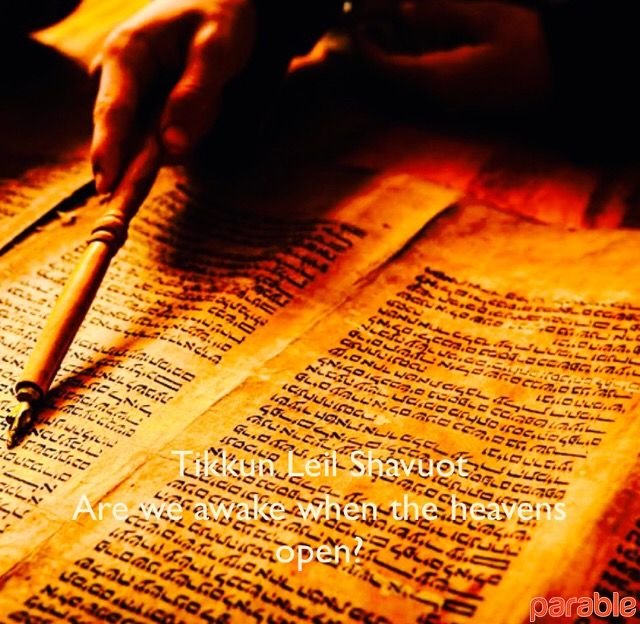
Rectification for Shavuot Night
According to a midrash, before God gave Torah to Israel, He offered Torah to the nations of the world in their own languages. All 70 nations refused the Torah; except Israel.
After hearing the various commandments, each nation made excuses for rejecting Torah e.g. Ishmaelites, did not submit to the prohibition of theft; Ishmaelite trade had theft built in! God finally turned to Israel who proclaimed, kol asher diber Adonai na'aseh "all that the LORD says we will do".
Israel chose Torah even before knowing what its commands were: na'aseh ve'nishma (Exo 19:8). Even after Moses had explained Torah's demands, all Israel were kol asher diber Adonai na'aseh ve'nishma "all that the LORD says we will do and obey" (Exod. 24:7).
In Jewish tradition, Shavuot commemorates the giving of the Law to Moses on Mount Sinai. When Moses came down with the Law, the children of Israel were asleep!
After celebrating kiddush & the Shabbat meal, on the night of Shavuot, Jews stay awake until dawn, reading selections from the Torah & the Talmud. This is because of tikkun leil shavuot.
Tikkun leil shavuot, rectification for Shavuot Night, attempts to repair, tikkun, the error of not being prepared to receive the Torah on the morning of Sivan 6, when Moses came down with the Law.
We remain awake to show that, unlike the situation of our heavy-lidded ancestors at Sinai, there is no need to bring us to our senses; we are ready to receive Torah.
The anthology of passages from the Tanakh & Talmud is called a Shavuot Tikkun.
Special Shavuot Synagogue Readings
First day:
Torah portion: Exodus 19:1–20:23
Maftir: Numbers 28:26–31
Haftarah portion: Ezekiel 1:1–28, 3:12
Second day:
Torah portion: Deuteronomy 15:19–16:17
(If on Shabbat, Deuteronomy 14:22–16:17)
Maftir: Numbers 28:26–31
Haftarah portion: Habakkuk 2:20–3:19
The book of Ruth is often recited.
The prayer of supplication in
Deuteronomy 26
5 And you shall say before the Lord
your God, A wandering and lost
Aramean ready to perish was my
father [Jacob], and he went down
into Egypt and sojourned there,
few in number, and he became there
a nation, great, mighty, and numerous.
6 And the Egyptians treated us very
badly and afflicted us and laid upon us
hard bondage.
7 And when we cried to the Lord, the
God of our fathers, the Lord heard our
voice and looked on our affliction and
our labor and our [cruel] oppression;
8 And the Lord brought us forth out of
Egypt with a mighty hand and with
an outstretched arm, and with
great (awesome) power and with signs
and with wonders;
9 And He brought us into this place and
gave us this land, a land flowing with
milk and honey.
10 And now, behold, I bring the firstfruits
of the ground which You, O Lord, have
given me. And you shall set it down
before the Lord your God and worship
before the Lord your God;
11 And you and the Levite and the
stranger and the sojourner among you
shall rejoice in all the good which the
Lord your God has given you and
your household.
Yizkor memorial prayer in honor of
departed parents
Psalm 67 composed of forty-nine words.
Ashkenazi Jews recite the Akdamut,
an Aramaic acrostic poem by Rabbi
Meir ben Isaac Nehorai of Worms,
Germany.
“Were all the skies parchment and all
the reeds pens, all the seas inks
and everyone a scribe,
God’s grandeur still could not be
near spelled out.”
Open heavens
Jewish mystics believe that the heavens are open to receive the thoughts, study & prayers are awake on the anniversary of the giving of the Torah at Sinai.
Anticipating a wedding
Some Jewish mystics liken the Shavuot vigil to the time of anticipation & preparation prior to a wedding.
In the Talmud, if Shavuot is the marriage day between God & the Jewish people, between heaven & earth; then Passover is Israel's betrothal or engagement to God. The Lord is the Heavenly chatan groom seeks out the Jewish people His beloved kallah His bride. Torah represents ketubah the marriage contract.
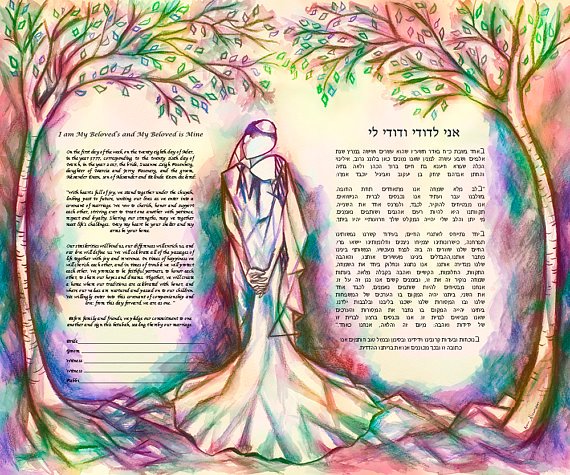
A ketubah (Hebrew: "written thing"; pl. ketubot) is a special type of Jewish prenuptial agreement. It is considered an integral part of a traditional Jewish marriage, and outlines the rights and responsibilities of the groom, in relation to the bride.
As per a midrash, when the Jews first drew near to hear the Ten Commandments, Mount Sinai was raised over the heads of the Jewish people like a chuppah wedding canopy!
Sephardic Jews tradition actually recite a ketubah on the holiday of Shavuot to remember their marriage to the Lord!
As a bride eagerly counts the days between her engagement and her wedding, Israel counts the days between Passover & Shavuot, when she was united with God through acceptance of Torah.

A chuppa is a canopy beneath which Jewish marriage ceremonies are performed.
The 120 disciples of Jesus were gathered in
Jerusalem for Shavuot.
When the day of Pentecost had fully come.
1 AND WHEN the day of Pentecost had fully come, they were all assembled together in one place,
2 When suddenly there came a sound from heaven like the rushing of a violent tempest blast, and it filled the whole house in which they were sitting.
3 And there appeared to them tongues resembling fire, which were separated and distributed and which settled on each one of them.
4 And they were all filled (diffused throughout their souls) with the Holy Spirit and began to speak in other (different, foreign) languages (tongues), as the Spirit kept giving them clear and loud expression [in each tongue in appropriate words].
Acts 2:1-4 AMPC
• Filled with Holy Spirit: promise of Father; power.
• Different tongues: the curse of Babel reversed.
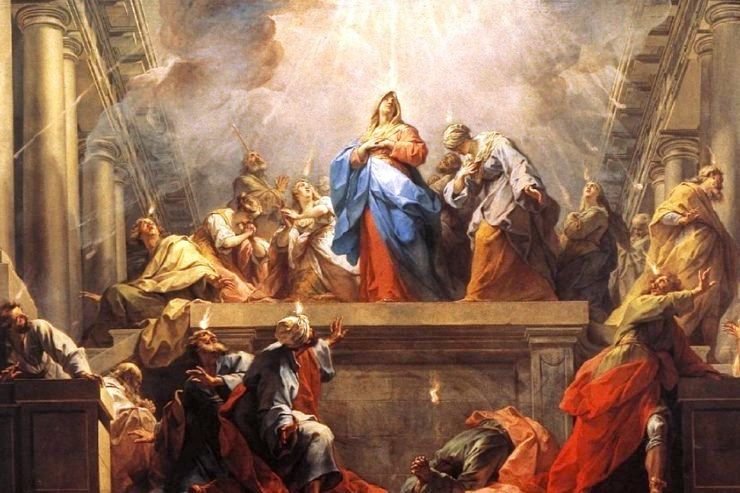
16 But [instead] this is [the beginning of] what was spoken through the prophet Joel:
17 And it shall come to pass in the last days, God declares, that I will pour out of My Spirit upon all mankind, and your sons and your daughters shall prophesy [telling forth the divine counsels] and your young men shall see visions (divinely granted appearances), and your old men shall dream [divinely suggested] dreams.
18 Yes, and on My menservants also and on My maidservants in those days I will pour out of My Spirit, and they shall prophesy [telling forth the divine counsels andpredicting future events pertaining especially to God’s kingdom].
19 And I will show wonders in the sky above and signs on the earth beneath, blood and fire and smoking vapor;
20 The sun shall be turned into darkness and the moon into blood before the obvious day of the Lord comes—that great and notable and conspicuous and renowned [day].
Acts 2:16-20 AMPC
• Holy Spirit poured out.
• Prophecy, dreams, visions.
• Signs & wonders.
• Reminder of the coming Day of the Lord.

Is Holy Spirit “ruach hakodesh” free to have His way in me?
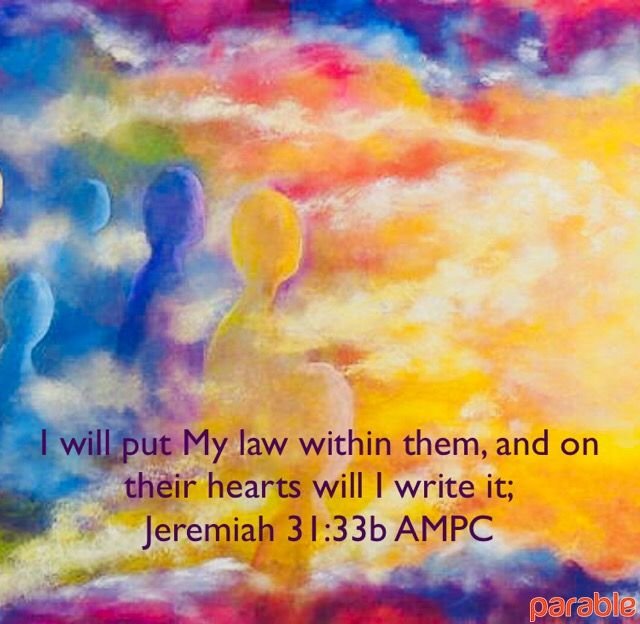
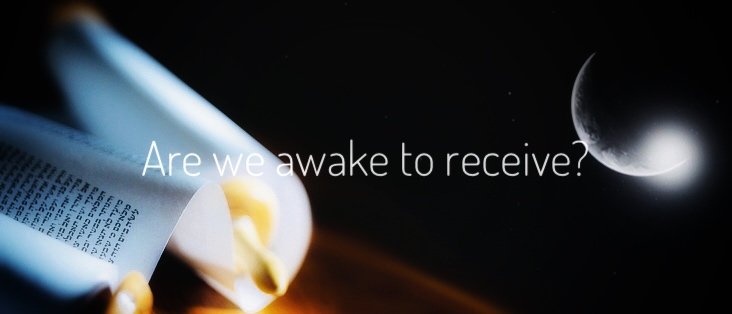
Dear @nigelmarkdias,
What a בְּרָכָה (blessing) to meet mishpocha on steemit. I am a Jewish believer in Messiah Yeshua. I loved you detailed description and timely teaching about Shavout.
I would like to share something the Ruach revealed to me concerning this Mo'ed:
El Shaddai - אל שדי is Hebrew for God Almighty. El is Hebrew for God and shaddai is Hebrew for Almighty. Shaddai comes from the root word shadad (shin dalet dalet) meaning to deal violently with, despoil, devastate, ruin, or destroy.
Suddenly a sound like the blowing of a violent wind came from heaven and filled the whole house where they were sitting. Acts 2:2
They saw what seemed to be tongues of fire that separated and came to rest on each of them. Acts 2:3
I believe that the tongues of fire had to be separated flames and they formed a ש.
Shaddai also may be connected to shadayim, the Hebrew word for “breasts.” It may thus be connected to the notion of God's gifts of fertility to the human race. Several instances in the Torah the name is connected with fruitfulness: “May God Almighty bless you and make you fruitful and increase your numbers…” Genesis 28:3. “By the Almighty who will bless you with blessings of heaven above, blessings of the deep that lies beneath, blessings of the breasts [shadayim] and of the womb [racham]” Genesis 49:25.
It is also interesting coincidence that Shavout is celebrated by eating dairy products.
I did a series three months ago entitled, REVEALING THE MYSTERIES OF THE BIBLE.
Following is the link to the introduction of the series. I am sure you will appreciate this post.
https://steemit.com/christianity/@lastdays/revealing-the-mysteries-of-the-bible
Shalom, Steven Sherman @lastdays
Thank you, Steven Sherman
Yours is an extremely underappreciated service to the community.
Following you. @lastdays
You may also like: Paris: Wannsee 2.0?
Dear @nigelmarkdias,
I thoroughly enjoyed Paris: Wannsee 2.0?
Hitler's Big Lie is still being used today. There has already been a two-state solution: Trans-Jordan and Israel. Israel is not an occupier. Jordan was the occupier of Israeli territory from 1948 to 1967. Israel liberated its own land in a defensive war!
I am following you as well.
Blessings in Yeshua, Steven Sherman @lastdays
Thank you. @lastdays
Also see Ruth: faithfulness & eternal legacy.
History about chirstianity...
Have a look. @sajib619